The B.C. government is readying to allow restaurants to buy alcohol from private retailers, and not exclusively from government stores, Attorney General David Eby told Business in Vancouver in an interview on June 19.
Restaurant and private liquor store owners have long sought the change. The benefit for restaurant owners would be a broader selection of products could be purchased at a moment’s notice, and that they could purchase so-called “specialty” products, which government stores do not regularly carry, in amounts that are less than a full case.
Retail store owners want to be able to sell to restaurants because it will increase sales and profits.
The hold-up for government has long been that if it allows restaurants to buy directly from private stores, its government stores would lose the retail mark-up that has been applied to the wholesale price.
With restaurants, starting at the end of July, able to buy alcohol from government stores at wholesale prices, there is no longer any risk to government revenues if the purchase is made at a private store.
Private stores would likely add a premium to the wholesale price for specialty products but give restaurant owners a discount for buying in volume.
“Restaurateurs can conceivably come into my store and buy two bottles of this, three bottles of that, four bottles of that, and three bottles of another wine and buy what he or she needs for that weekend, for that night or week,” said Marquis Wine Cellars owner John Clerides.
“What the government is forcing the restaurants to do is buy full case lots, so if you’re a small restaurateur and you want to have 30 wines on your wine list, and you want to have speculative or ‘spec’ items, you’re looking at $8,000 to $10,000 in cash outlay to buy these unique wines, let alone spirits or beers. You could conceivably come into my store and buy 30 different wines and populate your wine list for $1,000 or $2,000 dollars.”
Eby said he understands that making the change would make buying alcohol more efficient, thereby helping restaurants and private retailers. That is why work was going on to bring about the change before the COVID-19 pandemic arrived.
“Policy work on that has slowed significantly because of our response work around COVID, the patio initiative, wholesale pricing and direct delivery by restaurants – all that policy work and implementation is done by the same people,” he said.
The government’s patio initiative was to create a streamlined system to more speedily approve liquor licences for patios. In March, the government started to allow restaurants to deliver alcohol with meals.
Eby said that the initiative to allow restaurants to buy alcohol at wholesale prices could present a $50-million hit to government revenues if sales are at pre-pandemic levels.
That is in part why the government may wait until after a review of the change to wholesale pricing for restaurants is done after March, 2021, when what Eby called a “temporary” program is set to end.
“I've been very clear with industry,” Eby said. “Industry understands that the hospitality-price measure that we put in place, at this point, is temporary, and there will be a review in March.”
Restaurant owners told BIV that being able to buy alcohol at wholesale prices will be a boon for their businesses.
“I almost can’t believe this has happened because I’ve been looking at the situation for more than 20 years, and we’re one of very few jurisdictions where, as a restaurant liquor reseller, we haven’t had access to wholesale prices,” said Brix and Mortar co-owner David Hannay.
He sells dozens of wines by the glass and would like the ability to restock them on an emergency basis by being able to buy from a private wine store.
Cioppino’s may be the restaurant with the largest standing inventory of wine in the region.
Owner Pino Posteraro told BIV that he has about $3 million in wine inventory. His preference would be to buy wines by the case at wholesale prices rather than buying smaller quantities at slight mark-ups from that price.
Still, he would like the freedom to be able to make those decisions on a case-by-case basis.
“Most of my wine is ‘spec,’” said La Quercia and L’Uficio co-owner Karin Pegg. “I like to have wines that are not seen everywhere on the shelf, so I like the ‘spec’ wines. I’d like the freedom to buy those wines that I don’t have now [from private retailers.]”
Industry entrepreneurs told BIV that a bigger issue may be regulatory changes to streamline how alcohol is transported.
Many products must go to a private warehouse before being shipped to a government warehouse, and then being transported to the restaurant or retail buyer.
Not only does that create delays in getting products, it is bad for the environment because it creates more vehicle emissions, say corporate buyers.
“There are some pretty serious inefficiencies in the distribution system,” Eby acknowledged.
He said that his government commissioned Deloitte to draft a report in part on warehousing inefficiencies and that the report recommends “reduced handling.”
A separate change on warehousing that may also be on the horizon relates to B.C. wineries.
B.C. wineries are distinct among alcohol producers in that they are able to ship products directly to consumers. The catch is that the shipments must originate at the winery’s land-based winery site – not an off-site warehouse.
The result of that bureaucracy is that wineries sometimes have to ship products from a Vancouver warehouse to a Kelowna land-based winery in order to ship the product back to a consumer in Vancouver.
“That’s totally unnecessary,” Eby said. “There’s additional courier costs, emissions, you name it.”




